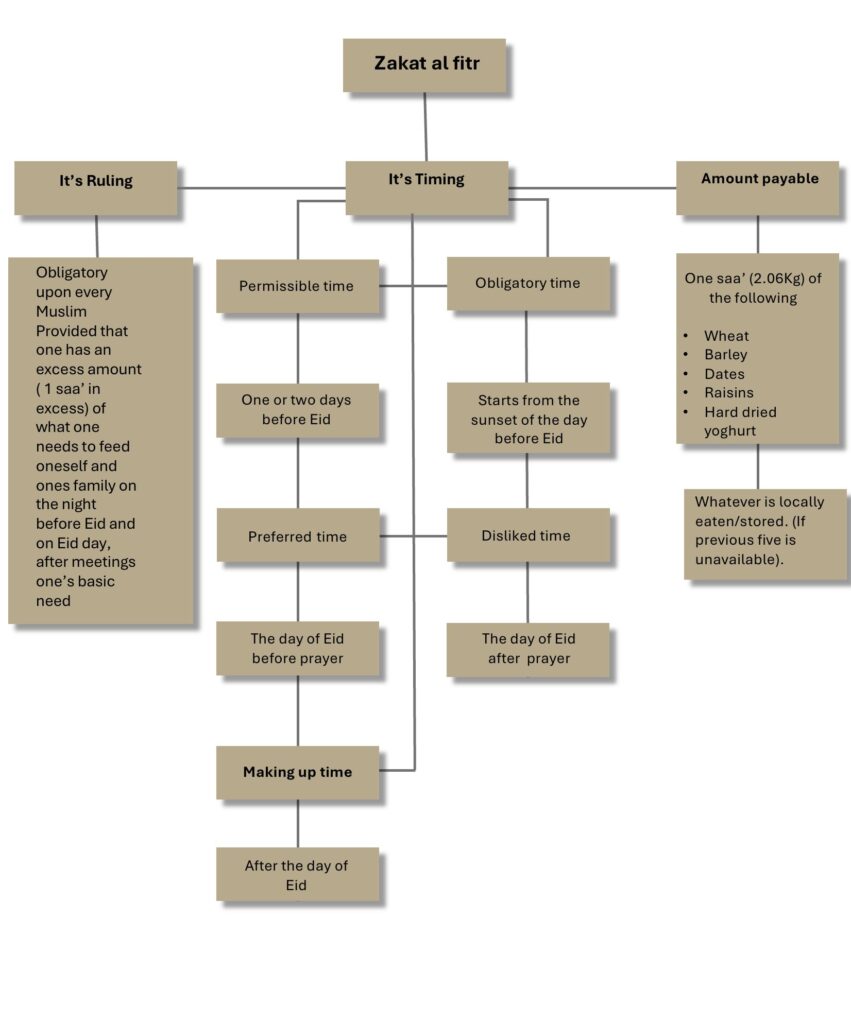Written by Barakah Capital Founder – Bilal Dannoun
Understanding Zakat Al-Fitr: The Second Zakat
As the crescent moon heralds the end of Ramadan, Muslims worldwide prepare to celebrate Eid Al-Fitr, not just as a festival of breaking the fast, but also as a time of giving through Zakat Al-Fitr. This charitable act is a purification for the fasting person from any indecent act or speech and to help the poor and needy.
The Obligation of Zakat Al-Fitr
Zakat Al-Fitr is mandatory for every Muslim, whether male or female, minor or adult as long as they have the means to do so. It is incumbent upon the individual to offer a specific amount of food to charity, provided they have food in excess of their needs for the duration of one night and one day – the period covering the eve of Eid and the day itself.
The Timing of Zakat Al-Fitr
The period for dispensing Zakat Al-Fitr extends over several days, primarily focused around the day of Eid:
- Permissible Time: It is allowed to be given one or two days before Eid.
- Obligatory Time: The duty begins at sunset on the last day of Ramadan and continues until the Eid prayer.
- Preferred Time: The most favorable time to give Zakat Al-Fitr is before the Eid prayer on Eid day.
- Disliked Time: Offering Zakat Al-Fitr after the Eid prayer is frowned upon and results in being merely an act of Charity (Sadaqah).
- Making-up Time: If it has not been given by the Eid prayer, it should be made up for after the day of Eid.
The Quantity and Type of Zakat Al-Fitr
An individual is required to give approximately 2.06kg of food to the needy. This can be in the form of:
- Wheat
- Barley
- Dates
- Raisins
- Hard dry yoghurt
If these items are not available or not customary in one’s locality, then any staple food that is locally consumed, like rice, can be given.
It is permissible to give cash or bank transfer of funds to an organisation who will purchase and distribute the food to entitled Zakat Al Fitr recipients. Every country or city will vary in the amount they collect. At the time of writing this (Ramadan 2024), the average amount being collected in Australia is $15 (AUD).
Who should receive Zakat Al-Fitr?
The majority scholarly opinion holds that Zakat Al-Fitr should benefit the same eight categories as general zakah, ensuring that this special charity reaches those in genuine need.
The venerable scholars, such as Al-Shafa’i and Al-Nawawi, have articulated that Zakat Al-Fitr should be allocated specifically to the poor and needy, those working to free themselves from bondage, individuals burdened with debt, those striving in the path of Allah, and travelers facing hardship.
It’s emphasized that the recipients must be Muslim, as both Al-Shafa’i and Al-Nawawi explicitly state the impermissibility of distributing any form of zakah, be it Zakat Al-Fitr or Zakat Al-Maal, to non-Muslims.
The Spirit of Zakat Al-Fitr
Zakat Al-Fitr is not merely a ritual; it is a social welfare mechanism that ensures that the needy can also celebrate the day of Eid without worry. By giving this obligatory charity, Muslims display unity, obedience, and gratitude. It’s a practical reminder that one’s spiritual practice has a social dimension, designed to foster community spirit and care for one another, especially the less fortunate.
Barakah Capital is committed to Shariah-Approved, ethical investment opportunities. By investing through Barakah Capital, you are investing in some projects that turn idle money into monthly passive income, freeing time for worship, fun, travel, and family. Our mission extends beyond financial gains to fostering hope and prosperity within our Ummah. With Allah’s will, we aim to grow by dedicating a significant portion of our profits to charity—starting with up to one-third and planning to increase this share as we expand. Our investments, historically yielding over 15% ROI on average.





